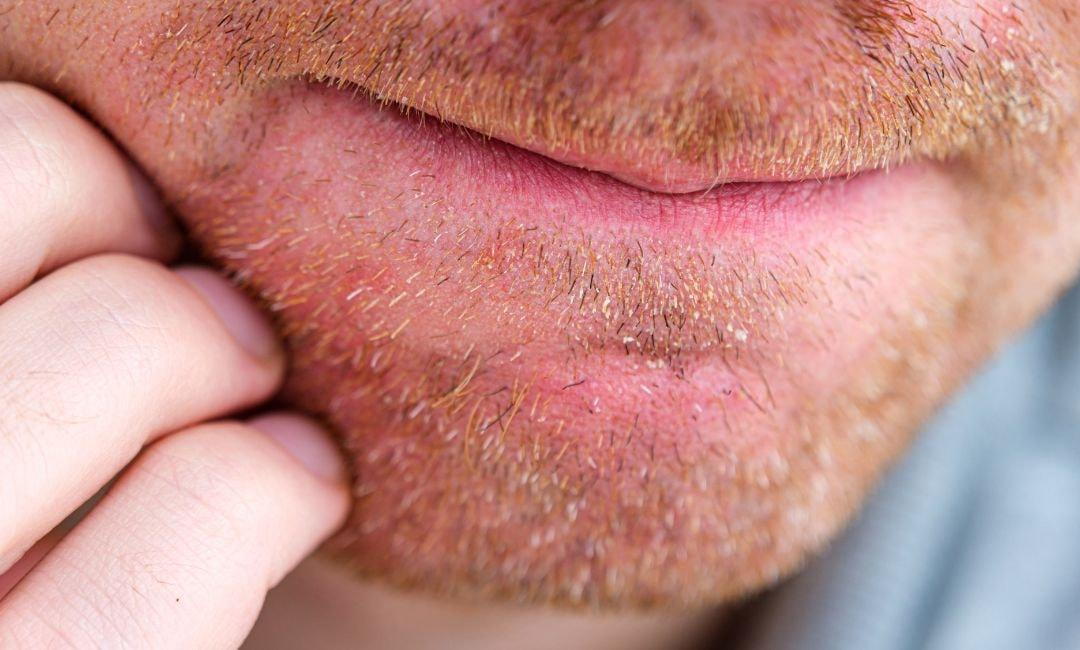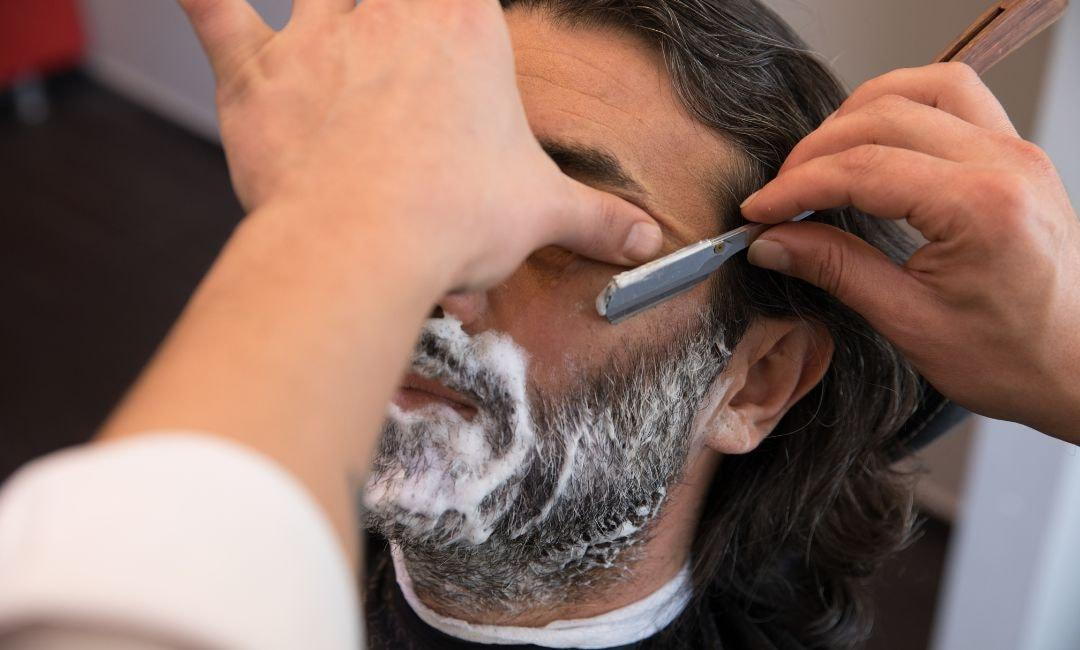Beard Dandruff

- posted: Oct. 08, 2024
Itchy, flaky beard got you feeling like a snow globe? You're not the only one. Beard dandruff is a common problem, but it doesn't have to be your problem. In this guide, we'll break down everything you need to know to banish those pesky flakes for good.
Here's the lowdown:
Causes of beard dandruff: We'll uncover the root of the problem (literally).
Prevention tips: Learn how to keep your beard flake-free in the first place.
Effective treatments: Discover the best products and techniques to tackle existing dandruff.
And hey, if you're in the Fort Lauderdale area and want personalized advice, the experts at Natura Dermatology & Cosmetics can help you get that beard looking its best. We offer a wide range of services, from acne treatments to cosmetic procedures.
Causes of Beard Dandruff: Why Is My Beard Flaking?
Beard dandruff isn't a sign of bad hygiene. It's actually a common skin condition that can affect anyone, even those with the most well-groomed beards. The main culprit? A tiny fungus called Malassezia globosa. This little guy lives on everyone's skin, but it thrives in oily areas like your beard. It feeds on your skin's natural oils (sebum) and produces oleic acid, which can irritate the facial skin and cause flaking.
But that's not the whole story. Here are some other factors that can contribute to beard dandruff:
Dry skin: Just like your scalp, your beard can become dry and flaky, especially in cold or windy weather.
Sensitivity to products: Harsh shampoos, conditioners, or beard oils can irritate your flaking skin and trigger dandruff.
Skin conditions: Conditions like eczema or psoriasis can also cause flaking in your beard.
Not washing your beard enough: Dirt, oil, and sweat can build up and irritate your flaky skin.
Over-washing your beard: Washing too often can strip your skin flakes of its natural oils, leading to dryness and flaking.
Stress: Stress can affect your skin health in many ways, including causing dandruff.
Hormonal changes: Hormonal imbalances can also contribute to dandruff.
Medications: Some medications can cause dry skin and dandruff as a side effect.
Diet: A diet that is low in essential nutrients can also contribute to skin problems, including dandruff.
If you're experiencing persistent beard dandruff, it's a good idea to consult a dermatologist. They can help you identify the underlying cause and recommend the best treatment plan.
Is it Dandruff or Seborrheic Dermatitis?
We've talked a lot about dandruff, but what about seborrheic dermatitis? They sound similar, and for good reason. Beard dandruff is actually a mild form of seborrheic dermatitis.
Seborrheic dermatitis is a common skin condition that causes red, flaky, and itchy patches on the skin underneath. It often affects areas with a lot of oil glands, like your scalp, face, and chest. When it appears in your beard, it's what we call beard dandruff.
So, how can you tell if you're dealing with regular dandruff or seborrheic dermatitis? Here are a few clues:
Severity: Seborrheic dermatitis tends to be more persistent and severe than regular dandruff.
Inflammation: Seborrheic dermatitis often involves redness and inflammation, while dandruff usually doesn't.
Location: Seborrheic dermatitis can appear in other areas besides your beard, like your scalp, eyebrows, and nasolabial folds (the creases between your nose and mouth).
If you're unsure whether you have dandruff or seborrheic dermatitis, it's always best to consult a dermatologist. They can properly diagnose the condition and recommend the best treatment plan.
Preventing Beard Dandruff: Keep the Flakes Away
So we know what causes beard dandruff, but how can you prevent it in the first place? The good news is that a few simple tweaks to your routine can make a big difference.
Here's the game plan:
Wash your beard regularly: But don't overdo it. Aim for 2-3 times per week with a gentle beard wash or shampoo. And remember to massage the cleanser into your skin to loosen those flakes.
Moisturize at lot: A good beard oil or balm can work wonders for keeping your skin hydrated and flake-free. Apply it after washing your beard, while it's still slightly damp.
Exfoliate weekly: Use a beard brush or a gentle scrub to remove dead skin cells and prevent them from clogging your pores.
Choose beard-friendly products: Avoid harsh chemicals and fragrances that can irritate your skin. Look for products specifically designed for beards.
Pat your beard dry: Don't rub. Rubbing can irritate your skin beneath and cause flaking.
Manage stress: Easier said than done, right? But finding healthy ways to manage stress can improve your overall health, including your skin.
Eat a healthy diet: Make sure you're getting enough vitamins and minerals, especially those that are important to make your beard healthy, like vitamin B and zinc.
Pay attention to the ingredients in your beard products. Look for natural oils like jojoba oil, argan oil, and coconut oil, which can help moisturize and soothe your skin.
Effective Treatments for Beard Dandruff
Here are some effective treatments to get your beard back to its majestic, flake-free glory:
Dandruff shampoos: Look for shampoos with ingredients like ketoconazole, selenium sulfide, or pyrithione zinc. These ingredients have antifungal and anti-inflammatory properties that can help combat dandruff. (Just remember to choose a formula that's gentle enough for your face.)
Tea tree oil: This natural oil has antifungal and antibacterial properties. You can add a few drops to your beard wash or dilute it with a carrier oil like jojoba oil and apply it directly to your beard.
Aloe vera: Aloe vera is known for its soothing and anti-inflammatory properties. Apply pure aloe vera gel to your beard to help calm irritation and reduce flaking.
Apple cider vinegar: Dilute apple cider vinegar with water and apply it to your beard. It can help balance the pH of your skin and reduce flaking. (But be careful, as it can be irritating to some people.)
Hydrocortisone cream: If your dandruff is severe or accompanied by inflammation, a low-strength over-the-counter hydrocortisone cream can provide relief.
Be patient. It may take some time to find the treatment that works best for you. And remember to be consistent with your routine.
Will Beard Dandruff Go Away If I Shave?

It's tempting to think that getting rid of your beard will get rid of the dandruff, right? But unfortunately, it's not that simple.
While shaving might temporarily reduce the appearance of flakes, it won't address the underlying cause of your beard dandruff. Remember that pesky fungus, Malassezia globosa? It lives on your skin, not just your beard. So, even if you shave, the fungus will still be there, ready to cause trouble again when your beard grows back.
Plus, shaving can actually make things worse. It can irritate your skin, leading to more dryness and flaking.
So, what's the solution? Instead of reaching for the razor, focus on treating the root cause of your beard dandruff. Follow the prevention tips and options to stop beard dandruff we discussed earlier. With a little patience and the right approach, you can conquer those dandruff flakes and keep your beard.
How Often Should You Wash Your Beard with Dandruff?
Finding the right beard-washing balance can be tricky, especially when you're dealing with dandruff. Wash too often, and you risk stripping your skin of its natural oils, leading to dryness and more flaking. Wash too little, and you'll have a buildup of oil, dirt, and dead skin cells, which can also mskr beard dandruff worse.
So, what's the magic number? Aim for 2-3 times per week. This usually strikes the right balance between keeping your beard clean and preventing dryness.
But here's the thing: everyone's skin is different. If you have particularly oily skin, you might need to wash your beard more often. If your skin is on the drier side, 2-3 times a week might be enough.
Pay attention to your beard and skin. If it feels excessively oily or dirty, it's time for a wash. If it feels dry or tight, you might be overdoing it.
Here's a quick guide to help you find your ideal washing frequency:
Oily skin: Wash your beard 3-4 times per week.
Normal skin: Wash your beard 2-3 times per week.
Dry skin: Wash your beard area 1-2 times per week.
And remember, always use a gentle beard wash or shampoo specifically designed for facial beard hair.
Beard Dandruff FAQs
How do you get rid of beard dandruff?
To prevent beard dandruff requires a multi-pronged approach. First, wash your beard regularly with a gentle beard wash or beard shampoo (not a regular shampoo). Moisturize daily with a beard oil or balm to keep your skin hydrated. Exfoliate weekly to remove dead skin cells. And finally, consider using a dandruff shampoo with ingredients like ketoconazole or pyrithione zinc a few times a week.
Why does my beard have so much dandruff?
Several factors can contribute to beard dandruff, including a tiny fungus called Malassezia globosa, dry skin, sensitivity to products, skin conditions like eczema or psoriasis, not washing your facial hair enough (or over-washing it), stress, hormonal changes, medications, and even your diet.
Does beard oil help with dandruff?
Beard oil can be a game-changer for dandruff. It helps to moisturize your skin, which is crucial for preventing dryness and flaking. Look for beard oils with natural ingredients like jojoba oil, argan oil, and coconut oil.
What is the best way to hydrate a dry beard?
The best way to hydrate a dry beard is to use a beard oil or balm. Apply it after washing your beard, while it's still slightly damp. You can also use a beard conditioner in the shower. For an extra boost of hydration, apply a small amount of coconut oil to your beard before bed.
Can a dry beard be saved?
Yes, a dry beard can definitely be saved. With the right care and attention, you can restore its moisture and health. Regular washing, moisturizing, and exfoliating are key. You may also want to consider using a deep conditioning treatment once a week.
Is coconut oil good for a beard?
Coconut oil can be a great addition to your beard care routine. It's a natural moisturizer that can help soften your beard, reduce itchiness, and prevent flaking. However, it's important to use it in moderation, as too much can make your beard greasy. If you have acne-prone skin, you may want to avoid using coconut oil on your beard, as it can clog pores.
Ready to Show Off That Flake-Free Beard?
You're now armed with the knowledge to conquer beard dandruff and rock a healthy, handsome beard. It's all about finding the right routine and products for your skin.
Here are the key takeaways:
Identify the cause: Is it dryness, a skin condition, or something else?
Wash and moisturize: Find the right balance for your skin type.
Exfoliate regularly: Keep those dead skin cells at bay.
Choose the right products: Look for gentle, beard-friendly ingredients.
Be patient and consistent: It takes time to see results.
And, if you're looking for expert advice or want to explore options to treat beard dandruff, don't hesitate to reach out to the friendly folks at Natura Dermatology & Cosmetics in Fort Lauderdale. We can help you achieve the beard of your dreams.
Contact Us
Our Locations
Broward Location
800 E Broward Blvd, Ste 507
Fort Lauderdale, FL, USA
Hours of Operation
8:30 am - 12:00 pm
1:30 pm - 5:00 pm
8:30 am - 12:00 pm
1:30 pm - 5:00 pm
8:30 am - 12:00 pm
1:30 pm - 5:00 pm
8:30 am - 12:00 pm
1:30 pm - 5:00 pm
8:30 am - 12:00 pm
1:30 pm - 5:00 pm
Closed
Closed


